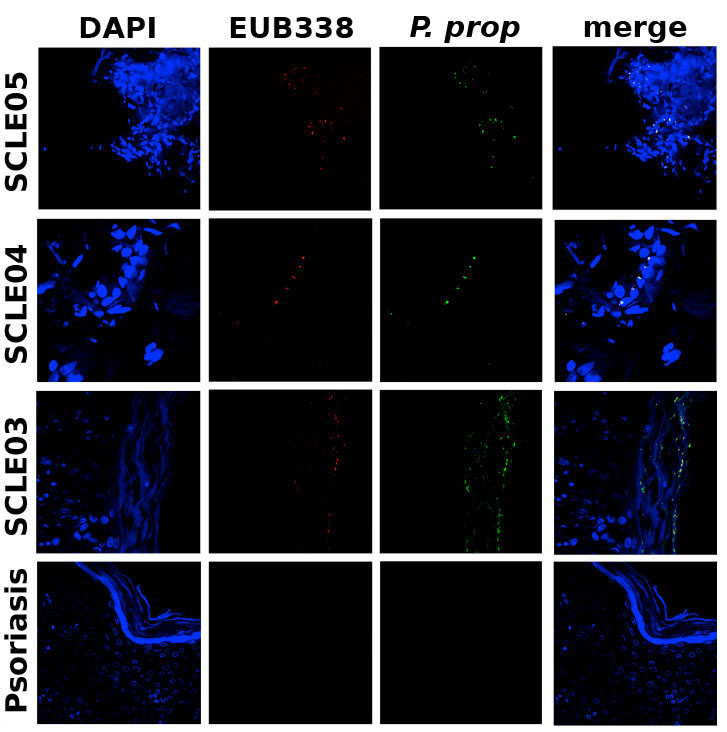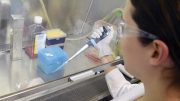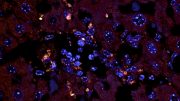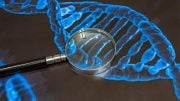
Fluorescent microscopy images of skin lesion samples from three patients with lupus (SCLE03- 05) and one patient with psoriasis. The samples demonstrate the presence of bacteria that contain Ro60 orthologs such as Propionibacterium propionicum (green) as well as several species of eubacteria (EUB 338, red). Credit: T.M. Greiling et al., Science Translational Medicine; DOI: 10.1126/scitranslmed.aan2306
In individuals with lupus, immune cells attack the body’s own tissue and organs as if they are enemy invaders. A new Yale-led study describes how a protein found in common bacteria triggers that auto-immune response. The finding opens the door to future therapies targeting the bacteria rather than the immune system, the researchers said.
To deepen understanding of the autoimmune response generally, a research team led by co-senior authors Martin Kriegel and Sandra Wolin, focused on a protein, Ro60, that has been found in lupus patients even before they developed symptoms. The protein induces the immune response and production of antibodies. In the study, the research team tested blood and tissue samples from patients with the most common form of the disease, systemic lupus. They identified Ro60 in bacteria from different parts of the body, including the mouth, skin, and gut.
The researchers theorized that the bacteria triggers an autoimmune response, which over time spreads to affect even healthy tissue. This chain of events leads to full-blown autoimmunity and lupus, Kriegel said.
The Role of Commensal Ro60 Orthologs in Lupus. This video summarizes the main findings of a study on the triggering role of gut and skin commensal proteins in human autoimmune disease. The work was performed in the laboratories of Martin Kriegel, M.D., Ph.D., and Sandra Wolin, M.D., Ph.D., at Yale School of Medicine. The research was published in the journal Science Translational Medicine on March 28, 2018 (Greiling et al., Commensal orthologs of the human autoantigen Ro60 as triggers of autoimmunity in lupus, Sci. Transl. Med. 2018). This work was supported by the National Institutes of Health, the Arthritis Foundation, the Lupus Research Institute, the Arthritis National Research Foundation, the Yale Center for Clinical Investigation, the Women’s Health Research at Yale, and the O’Brian Center at Yale.
More research is needed but the new insight could lead to the development of personalized treatments for autoimmune disease, he noted. For example, a topical medicine could be designed to target bacteria in the skin or other organs where autoimmunity manifests.
Reference: “Commensal orthologs of the human autoantigen Ro60 as triggers of autoimmunity in lupus” by Teri M. Greiling, Carina Dehner, Xinguo Chen, Kevin Hughes, Alonso J. Iñiguez, Marco Boccitto , Daniel Zegarra Ruiz, Stephen C. Renfroe, Silvio M. Vieira, William E. Ruff, Soyeong Sim, Christina Kriegel, Julia Glanternik, Xindi Chen, Michael Girardi, Patrick Degnan, Karen H. Costenbader, Andrew L. Goodman, Sandra L. Wolin and Martin A. Kriegel, 28 March 2018, Science Translational Medicine.
DOI: 10.1126/scitranslmed.aan2306









Be the first to comment on "A Potential Personalized Approach To Treating Lupus"